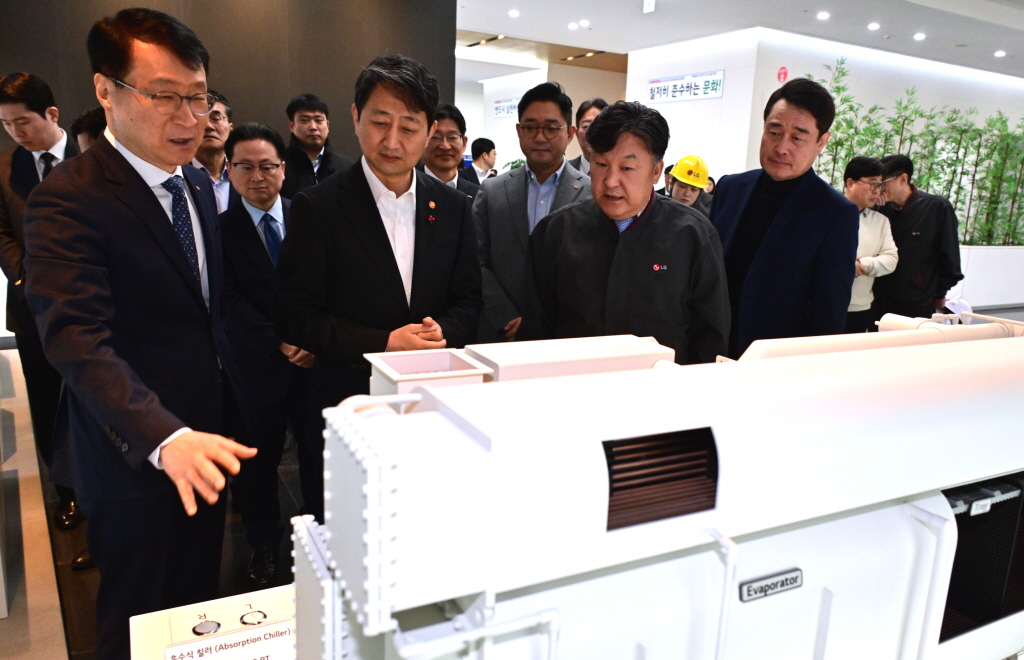안덕근 산업통상자원부 장관이 2일 LG전자 평택칠러공장을 방문해 인공지능(AI) 데이터센터 냉각시스템 생산라인을 직접 확인하고, 현장에서 업계의 의견을 청취하는 등 2030년 33억달러로 연평균 14%의 고성장을 할 것으로 전망되는 AI 데이터 센터의 핵심 인프라인 칠러 시장의 해외 시장 공략을 위해 민관이 총력 공세에 나선다.
안덕근 산업부 장관 LG전자 평택 칠러공장 방문
칠러, 데이터센터 발열 이슈 해결 솔루션 급부상
2030년 33억달러로 연평균 14%의 고성장을 할 것으로 전망되는 AI 데이터 센터의 핵심 인프라인 칠러 시장의 해외 시장 공략을 위해 민관이 총력 공세에 나선다.
안덕근 산업통상자원부 장관은 2일 LG전자 평택칠러공장을 방문해 인공지능(AI) 데이터센터 냉각시스템 생산라인을 직접 확인하고, 현장에서 업계의 의견을 청취했다.
LG전자 평택칠러공장은 미국의 주요 빅테크 기업 데이터센터 수주계약을 체결하는 등 가시적인 성과를 창출하고 있는 AI 데이터센터용 칠러(Chiller) 생산의 핵심 기지다.
데이터센터는 AI 구현을 위한 핵심 인프라로, 산업부는 AI 반도체·전력기자재·냉각시스템을 글로벌 AI 열풍을 기회로 차세대 수출 동력으로 육성할 수 있는 3대 전략 품목으로 인식하고 집중 지원해왔다.
안덕근 장관은 AI 반도체는 국내 기업이 선도하고 있는 HBM에 힘입어 역대 최고 수출 실적을 경신할 것으로 전망되며, 데이터센터의 안정적 전력공급을 위한 전력기자재도 우리 수출의 핵심 품목으로 자리잡았다며 이제는 발열 이슈를 해결하는 솔루션으로 급성장하고 있는 냉각시스템을 우리 수출의 주역으로 육성해야 한다고 강조했다.
칠러는 데이터센터 내부 장비가 과열되지 않도록 파이프를 통해 냉각수를 공급하는 장치다.
LG전자는 2011년부터 칠러 사업을 본격 전개해 터보 칠러 분야에서 국내 1위, 글로벌 5위의 점유율을 기록하고 있다.
LG전자는 대용량 공랭식 칠러에 무급유 자기베어링 기술을 적용하는 등 차별화된 기술력을 확보하고 있으며, 냉난방공조 설비를 하나의 시스템으로 제어·관리하는 소프트웨어 경쟁력도 갖추고 있다.
데이터센터는 챗 GPT와 같은 생성형 AI가 대중화되면서 전력 소비량이 크게 증가했다. 이에 기존 냉각 시스템으로는 효율적으로 열을 관리하기가 어려워졌고 LG전자의 초대형 냉방 기술 칠러가 데이터센터 핵심 인프라로 부상했다.
데이터센터 냉각시장은 2030년까지 172억달로 2배 이상 성장 할 것으로 전망되며, 칠러는 33억달러로 연평균 14% 성장, 액체냉각은 46억달러로 연평균 15%의 고성장을 할 것으로 예상된다.
이재성 LG전자 ES사업본부장은 “칠러는 LG전자의 B2B 성장을 끌어온 냉난방공조(HVAC) 사업의 중요한 축”이라며 “정부와의 협업과 소통을 강화해 AI시대 칠러 사업의 미래 경쟁력을 높여 나갈 것”이라고 말했다.
안덕근 장관은 “칠러, 항온항습기 등 냉각시스템에 대해 연말까지 총 3,500억원의 수출보험을 집중 지원하고, 코트라 무역관 등을 활용하여 해외 데이터센터 신설 프로젝트를 발굴, 발주처를 초청하여 상담회를 개최하는 등 우리 기업들의 글로벌 데이터센터 시장 진출을 적극 지원하겠다”고 밝혔다.
또한 “냉각시스템 기술 고도화 등 핵심기술 확보를 위해 1,300억원, 최첨단 냉각시스템인 액침냉각 실증 등을 위해 180억원을 지원하는 등 냉각시스템 경쟁력 강화도 총력 지원하겠다”고 덧붙였다.
